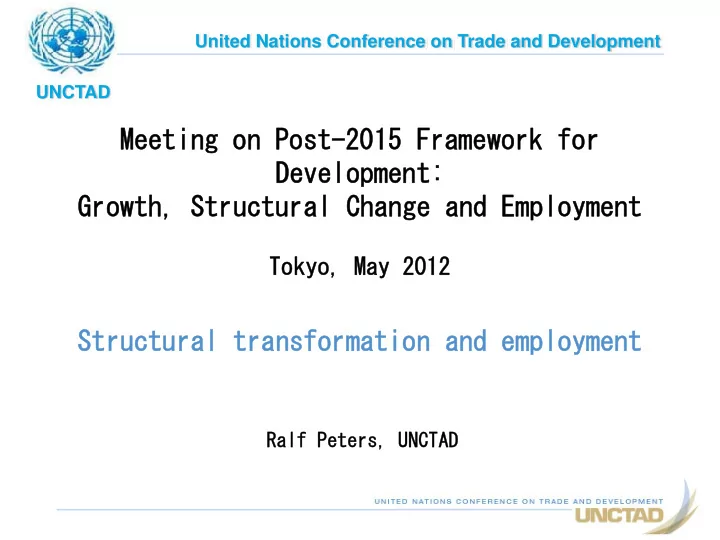

United Nations Conference on Trade and Development UNCTAD Meeting on Post-2015 Framework for Development: Growth, Structural Change and Employment Tokyo, May 2012 Structural transformation and employment Ralf Peters, UNCTAD
Structural transformation urgently needed Least developed countries • Many LDCs have no industrial base • Little supply capacity; often exporters of resources; high share of workforce in low productivity agriculture Middle income countries • Many countries are stuck in early and middle income stages of development Rising inequality • Need for inclusive growth
SST (US$ 3.5 billion, 2010): Share by Regions SST (US$ 3.5 trillion, 2010): Share by Region Africa = 6% (of which 3.7% is 100% From Americas = 10% to Asia) (of which 4.2% is to Asia) 80% 60% 40% From Asia = 84% (of which 74% is intra-Asia) 20% 0% 1
Low trade barriers: Challenges ahead Globalization and way of production • Increasing specialization • Do scale effects lead to increasing agglomeration? • Is it still an option to start with labour intensive light manufacturing? • Are policy options limited? Economic and financial crisis • Demand in developed countries slows down • Protectionist measures
Opportunities ahead Globalization and way of production • Will lower transport costs allow production of goods and services around the globe? • Does production in supply chains make it easier to break into global markets? • … but value addition matters • Outward orientation possible Economic and financial crisis • South-south cooperation offers an opportunity • Growing markets
Interest in industrial policy made a comeback Developmental state Not “picking winners” Industrial policy by institutional design • Incentives and institutions that support self-discovery • Establish and accelerate process that focuses on learning Providing good conditions: market enhancing governance • Predictable economic environment • Reasonably secure property rights • Investment in human capital State active beyond those conditions • Socialized long-term investment risks • Support services: technology, training and exporting
THANK YOU ralf.peters@unctad.org
Recommend
More recommend